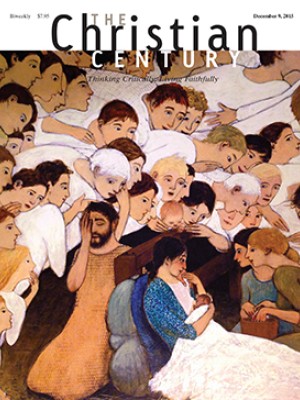December 13, Third Sunday of Advent: Zephaniah 3:14-20; Isaiah 12:2-6; Philippians 4:4-7; Luke 3:7-18
I am an Advent junkie. I love the hymns—“Watchman, Tell Us of the Night”; “What Is That Crying in Jordan?” I love Jesse trees, and Advent calendars, and the saffron-and-currant buns I bake for St. Lucia Day. I love the “intergenerational Sunday school” event of making Advent wreaths, and I especially love the candle we light on the third Sunday of Advent, the only one that’s pink.
The burst of pink offers a welcome bit of respite—because Advent is also, in its way, dreadful. By “dreadful” I don’t mean “unpleasant”; I really am talking about dread.
Advent places expectation before us, expectation of both judgment and delight. But thus far, the lectionary has given us mostly judgment. Even if at home you’re dragging a crèche down from the attic, at church we don’t get much about the babe until week four. And for the first two weeks of end times reflection, we’ve heard very little joy and a great deal of dread. “Be alert at all times,” we were told in week one, “praying that you may have the strength to escape all these things that will take place.” The next week it was “Who can endure the day of his coming, and who can stand when he appears?” This is end times terror.
Read our latest issue or browse back issues.
It is something of a relief, then, that the readings for week three interrupt the dread with a cascade of joy. With these readings (and with the pink candle), our imagination of the end is expanded to include not just judgment but also delight. No longer are we praying to escape judgment—now we are singing with gladness because, per Zephaniah, “The Lord has taken away the judgments” against us. Now, per Isaiah, we are drawing water from the wells of salvation, trusting God and spurning fear; we are shouting and singing for joy. No longer are we quaking about the Lord’s coming. Rather, per Paul, we are rejoicing in the Lord and practicing gentleness. We do not fear—precisely because the Lord is near.
I don’t always read the Bible aloud, but these three readings seem to want to be read this way—they seem to compel proclamation. I complied with the texts’ prompting, and I found that my posture changed. I got less hunched over; my shoulders opened up—my whole body opened up, really. I was smiling by the time I got to Philippians. The readings don’t just describe joy; they produce it. We rejoice because we are nearing the Nativity, the birth of the child who stitches all of humanity into intimacy with the God of Israel. And we rejoice because once we peer through the judgment, we see that it is actually a thing of joy to look toward the end. Rejoice, rejoice, rejoice! Thus the practice of calling this day Gaudete Sunday: Gaudete! Rejoice!
And then we get to the Gospel. After all those happy hymns, the Luke reading seems jarring and abrupt. There we are, channeling the Philippians, rejoicing always and reveling in the surpassing peace of God, and then John the Baptizer shows up and calls us a brood of vipers. Rejoice, rejoice—but then we’re back to God’s wrath, from which, John insists, neither baptism nor kinship with Abraham will protect us.
This Gospel text seems like a gloomy relative, interrupting our holiday cheer by warning us not to forget the threats of judgment we’ve heard earlier in Advent: “Even now the ax is lying at the root of the trees; every tree therefore that does not bear good fruit is cut down and thrown into the fire.” And yet the reading ends by insisting that this, too, is somehow joyful: “So, with many other exhortations, he proclaimed the good news to the people.”
This tension between the joy of the first three readings and the judgment of the Baptizer’s proclamation is, I think, theologically instructive. It presses us to find joy in judgment, or at least to hold the two together. Judgment, after all, is not finally about punishment or castigation. To judge something is to see it as it is—and God’s judgment is the act by which God sees us as we are.
Is this good news? The answer depends on what you think you are, what you think God will see. On the days when I think I am horrible, the idea of being seen by God is dreadful (there’s that word again) and terrifying. But Advent insists that eschatological joy belongs inseparably alongside eschatological judgment, and this implies that perhaps God doesn’t see what is horrible about us. This suggestion is not woolly, naive evasion; it’s Augustine, on whose terms our horrors cannot be seen—they are lacks, which do not yield themselves to the gaze.
The thread that holds Gaudete Sunday’s joy together with judgment is, simply, hope—the age-old Christian hope that we can indeed be seen and that by the time we are seen we won’t be horrible. To borrow John the Baptist’s metaphor, hope is the anticipation that when we finally face God’s judgment—God’s gaze, God’s seeing us as we are—Jesus will have removed the chaff (which, again following Augustine, is not a thing that can be seen anyway). When God comes to see us as we are, what God will see is wheat—and God’s seeing it will make it wheat at its finest. Thus, rejoice in the Lord always; the Lord is near; rejoice!






